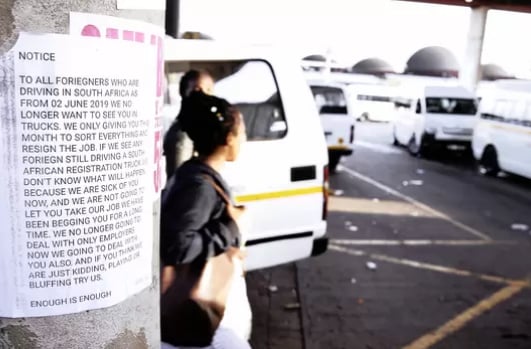
Durban – Chairperson of All Truck Drivers’ Foundation (ATDF), Sipho Zungu, has said that although they want employers to hire South African truck drivers, they were not behind posters warning foreign drivers to leave South African trucks.
“I don’t know anything about those posters and our people would never do that. We’re not violent,” Zungu said.
He said they wanted employers to hire the “right people”, and they were the ones with the experience South Africa lacked.
“They should give the jobs to us. We’re the ones who are hungry, but they are feeding people from the outside,” he said.
Xenophobic violence
Meanwhile, experts have called for the establishment of a specialised investigating team to prevent a repeat of xenophobic violence in the country after the putting up of the posters.
The walls of the Pinetown taxi rank, west of Durban, were plastered with A4 posters warning foreign truck drivers to leave their jobs by June 2, or face the consequences. The poster does not divulge the consequences.
Johan Burger, a senior researcher at the Institute for Security Studies, said police should investigate the source of the posters and take action.
“For the police to prevent serious consequences, they should form a specialised investigating team, with detectives and crime intelligence officers. This is an urgent matter as the organisation behind this can ignite another xenophobic attack, which could spread widely.”
Burger warned of a repeat of 2008 when 69 people were killed and many were injured in xenophobic attacks around the country.
In recent months in KwaZulu-Natal, several trucks were burnt along the N3 by people protesting against the hiring of foreign nationals as drivers.
“There is some organisation behind this, which could result in incitement. The government needs to launch a more aggressive campaign on the dangers of xenophobia. They regularly call for people to refrain from xenophobic actions and for them to be more tolerant,” Burger said.
SAPS national spokesperson Brigadier Vishnu Naidoo said they were aware of posters being shared on social media, but not of the posters at the taxi rank.
“We sent out a stern warning to anyone found committing a crime against anyone, whether it is a foreign national or not, they will be dealt with,” he said.
Naidoo said they had been in talks with truck drivers and owners since truck-related violence spiked at the beginning of the year.
The posters at the taxi rank do not have contact details but the posters circulating on social media do.
The landline number did not exist and a man who answered the cellphone number on the poster said he knew nothing about the posters.
A Durban truck owner said he was not aware of the posters, but he did not hire foreigners as drivers.
However, the man said the poster was “quite serious” and should be circulated to all relevant authorities to receive the attention it deserved.
A foreign truck driver, who asked SA Trucker not to name him, said he had been driving all over South Africa since 2007, but now only drove in the Eastern Cape.
The 38-year-old man said he had not heard about the posters.
“We must work together as brothers, but we’re scared now. We want to work, but we’re scared,” he said.
The man said he did not understand what the problem was because they were all paid the same amount.
SA Trucker spoke to a South African truck driver who said he did not have a problem working with foreign drivers as long as they are documented.
“The problem with many of these foreign drivers is that they don’t have valid documents to drive or to be legally in the country, as long as they have their papers in order they should be allowed to work,” said the driver who asked to be identified as Vusi.
Dialogue and social cohesion
Michael Vorster, a former bishop of the Methodist Church, said it did not take much for people to turn on foreigners because there was a lack of economic resources.
“When there’s a crisis, we have outrage for weeks and months, but there are no ongoing programmes, dialogue and social cohesion,” Vorster said.
He said neighbours should get to know each other better and share their histories with each other to create mutual understanding.
“That needs to happen more and more in the right spaces – in the communities and with the ward councillors,” he said.





